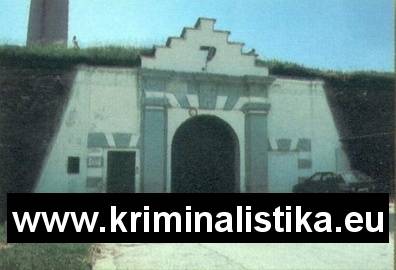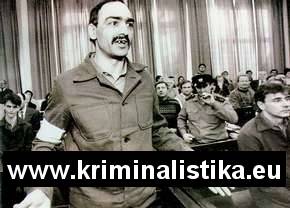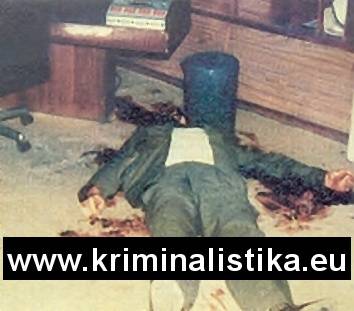BLESSED DOMINICK TRCKA
SING CHRISTMAS CAROLS!
Today, August
25th, we Redemptorists celebrate the life of Blessed Dominick Trcka (1886-1959).
He was a Redemptorist who served in many places in Eastern Europe as well as in the Ukraine. He worked in both the Latin and Byzantine rites.
He was a Redemptorist who served in many places in Eastern Europe as well as in the Ukraine. He worked in both the Latin and Byzantine rites.
He died on March 23, 1959 of
pneumonia in the horrible Leopaldo prison in Czechoslovakia - now in Slovakia .
While in prison the Christmas before - he was heard singing Christmas Carols. This got him put into solitary confinement - which was cold and damp - causing his death - along with all the other tortures he suffered.
Pope John Paul
II declared him blessed on November 4, 2001 - also having declared him a martyr
earlier that year - April 24, 2001.
Leopoldov Prison, Slovakia
a riot in March 1990
five warders murdered in November 1991

The Leopoldov Prison used to be one of the closest prisons in the former Czechoslovakia. Criminals sentenced to longtime penalties and state criminals, sentenced in the 1950s, were doing time there. Dr. Gustáv Husák, the former President of Czechoslovakia, was kept under arrest there, too.
The prison was built as a fortress in the second half of the 17th century. It is a starshaped fortress with two gateways. The external walls are ten meters high and twenty-five meters wide. Each gateway was equiped with a drawbrigde. There was a small brewery and a cowshed there.
The very first riot breaks out on April 23rd, 1689. Some of the freelances make head against the deputy base commander. They occupy the gateways and want to take the deputy base commander. He draws the sword and pinks one of the freelancers. The others get frightened and fall back. The riot is suppressed by the Leopoldov commissioner, Jakub Mochmayer. The risen freelancers are caught and brought to justice. On June 19th, 1689, two ring leaders are sentenced to death, the rest of the rebels are chastised.
The gateway

The fortress is changed into a prison in 1855. A kitchen, a laundry and a factory building are built there. The southern part is used as the prison, the northern part is used as the dormitory for the clarks and the warders. The architecturally unique building from the 17th century is under cover of the Relic Authority and stays unchanged till March 1990. The prison capacity is 2,500 prisoners. All of them are under the most strick prison rules (the 3rd reformative training).
On January 1st, 1990, Václav Havel, the newly elected President, proclaims the biggest amnesty in the history of Czechoslovakia. 23,260 out of 31,000 prisoners are released in several weeks. 652 prisoners are released from Leopoldov Prison. Dagmar Burešová, D. C. L., the newly established Minister of Justice, even wants to close down the prison...
The prison on fire (a picture from the Police videorecording)

The riot breaks out on March 15th, 1990. 217 prisoners who are not concerned in the amnesty start their hunger strike and drive out the warders from the billeting area. Some other prisoners join them and they take possession of the kitchen and the magazine. The foodstuff there is worth 1,5 million CZK. They gain control of the whole prison, put up the barricade and start to arm with stabbing and cutting weapons made from engine plants which belog to TOS Trenčín and Liberec fabric combine. The engine plants remains are destroyed then. They make their own frangible grenades in case of defence. The grenades are filled with petrol and oil taken from the prison car fleet. They even make their own flamethrower. 150 prisoners who refused to participate in the plundering and destroying of the prison are take by hostage. The rebels refuse to negotiate and insist on discharge.
The frangible grenades - the prisoners' defence

On March 28th, 1990, from 09:30 a. m. to 05:00 p. m., Andrej Sámel, D. C. L., the then Slovakian Undersecretary of Justice, and the prosecuting attorney are acredit to make the Leopoldov rebels give up. They give the President's and the government agents' effort to satisfy within the law all the rebels' demands. The rebels are warned if they do not obey the police calls to stop the riots, force will be applied. The rebels swear at them and start throwing the frangible grenades in response to their calls. They set some places on fire finally.
512 policemen from Trnava, 100 policemen from the Police Academy (Bratislava), 62 members of Specwar Team and 350 members of the Prison Guard are concerned in suppressing the riots. Three police helicopters, 12 vans, 23 pump water tender and 80 police dogs are used in the suppression. 200 aid men are ready in a prison hospital and three blood-transfusion units.
The most aggressive group of prisoners

The most aggressive group of prisoners barricade on the roof of a prison building and set the entrance on fire. They store with flamethrower. Two hostage-prisoners are chosen to be burnt to death on the roof just to stop the police forces. Both of them are rescued from the roof under a dramatic circumstances by the police helicopter.
The rebels throw burning pallets and frangible grenades out of the windows at the policemen below. They throw some heavy objects from the roof. The rebels are equiped with sharp-edged iron rods, daggers, machetes, knuckledusters or just with knives or razor blades. The riots are suppressed after two hours and a half and all the rebels are put into alternate prisons. More than 200 murderers are among them...
The rebels give it up

A dead prisoner is found in one of the buildings after the fight. The autopsy proves that he died in explosion. "His home-made bomb" is thought to explode while being handled uncarefully. Twenty-nine rebels are injured. Eleven policemen suffered an injury too. One of them is wounded very badly. The damage to the buildings reaches 30 million CZK. The prison itself becomes completely unserviceable. There are eleven buildings. Five of them are burnt down. The factory buildings are destroyed completely. It was the largest riot in the history of Czechoslovakian prison service. Tibor Polgári is proved to be the ring leader and a self-proclaimed prison governor...
The politicians and "the democratic" journalists comment on the televised suppression spots. They complain both about "the police brutality" during the suppression and about the fact that the rebels were naked in those spots. The reason is simple: a naked prisoner cannot hide a weapon on his body… Although the foreign experts speak about a high quality and professionalism in dealing with the suppression, Col. Sámel, D. C. L., the officer in charge, is run off his job.
A prisoner being handcuffed

On January 24th, 1992, Bratislava district attorney charges 73 mutineers with 32 crimes. The trial starts on October 15th, 1992 and takes place in Leopoldov Prison, in a reconstructed cinema. 33 solicitors are present there. 290 witnesses are heard, including the then high state officers - Ján Langoš, Richard Sacher and Vladimír Mečiar. All of them visited the prison during the riots of their own will and are said to promise the prisoner to be discharged. On April 21st, 1993, Jozef Holič, D. C. L., the preciding judge of the Bratislava Regional Court pronounces the judgement: 345 years and 10 month for 61 mutineers. The trial took place for more than six months. A eighteen-months imprisonment is the minimum sentence, a 14.5-year imprisonment is the maximum sentence. Five of the accused are exempted from blame. There are 105 prison warders to insure the order during the trial. The legal charges worth 3.5 million CZK...
Tibor Polgári, the prisoner at the trial - "the prison governor" during the riot

Another shocking event happens in Leopoldov on November 23rd, 1991, short before 8 p. m. Seven prisoners decide to escape from the prison. They work out a plan and they fulfil it to a ribbon. Tibor Polgári (30), a prisoner and "a self-proclaimed prison governor", hits František Sloboda's head (a warder) and another prisoner, Miloš Uriga (22), stabs the warder's chest seven times by a "home-made" knife. They strip the dead warder off and Polgári goes into his uniform. Polgári, Uriga and five more prisoners attack and bind two warders and steal their uniforms and the grate keys. Plogári and Uriga break into the control room near the front-gate and stab the warders (Igor Jošt, Milan Galbavý, Marian Zenner and Milan Černý) to death. The oldest warder is fifty, the youngest one is twenty-two.
The murdered warder

Tibor Polgári stabs to death three of them. Two warders survives just due to an early first aid. The intruders get possession of two machine guns and four pistols in the control room. Armed Polgári and Uriga return to the five co-prisoners guarding the bound warders. They take a warder by hostage and leave the prison. A knife jabbed in the head of a warder illustrates Polgári's extreme cruelty. The warders, according to the unexpired rule, had no gun on them while being attacked by the prisoners.
The fugitives use the guns to attack and rob the drivers of their cars. Several people are hurt. They even wound a driver who lends them a helping hand after their crashing into a tree with a stolen car. They want to escape to Poland and then to Australia. All the fugitives are captured in a wide police operation within twenty hours. Tibor Polgári is the only wounded - he is shot up when he tries to shoot at the policemen from the stolen machine gun. He calls it "a self-defence" at the trial...
The condemned involved in the escape:
The condemned involved in the escape:
Tibor Polgári at the trial

Ondrej Harvan, Tibor Polgári and Miloš Uriga are sentenced for murdering the warders to life imprisonment by the Regional Court in Bratislava on February 2nd, 1993. Vladimír Duda is about to spend thirteen more years in prison, Dalibor Bajger and Vladimír Fedák are sentenced to a fifteen-year imprisonment and Bartolomej Botoš is sentenced to an eighteen-year imprisonment. Ondrej Harvan commits a suicide two years later. Tibor Polgári has become a real hero to the Slovakian half-world.
The cause of the Leopoldov riot and murdering five warders can be seen in amateurich decisions of the then ministers of justice and the then politicians attempt to "humanize" the prison service. By the way, in the USA, the prisoners starting their sentence sign a declaration warning them of a real danger of being shoot to death in case of a revolt or an escape attempt. The American statistics prove that hardly any fugitive survives their attempt to escape...
(The photographs of the riot come from the Police videorecording)
Translated by inspector WO Pavel Vršovský, M. A.





